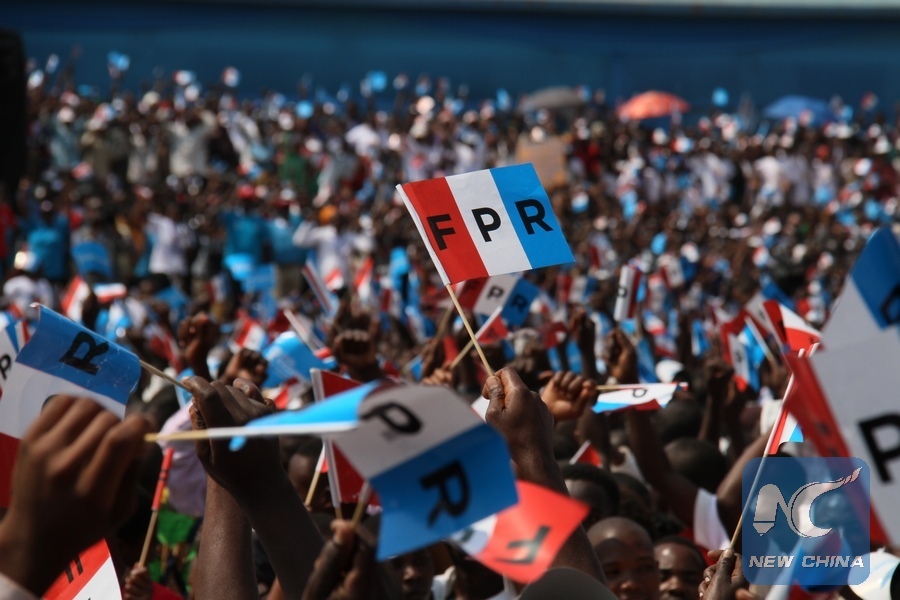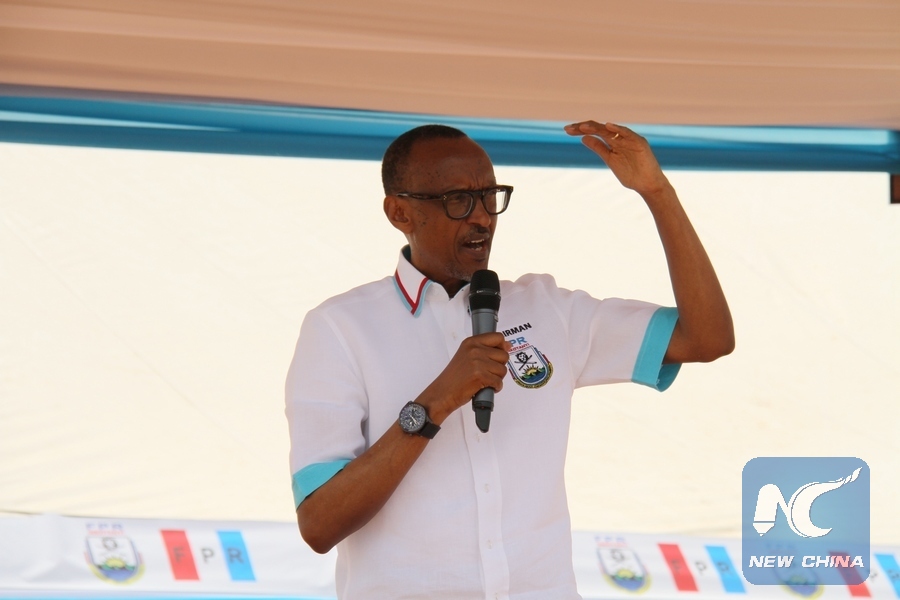
Supporters of Rwandan presidential candidate Paul Kagame, the incumbent President of Rwanda, hold up flags of the ruling party Rwandan Patriotic Front at a presidential campaign rally in Ruhango, Rwanda, on July 14, 2017. Rwanda's presidential campaigns officially kicked off on Friday. The ruling party Rwanda Patriotic Front (RPF)'s presidential candidate Paul Kagame, who is seeking a third term, has launched his campaigns in his childhood home town of Ruhango District, Southern Rwanda. (Xinhua/Lyu Tianran)
by Lyu Tianran, Mohammed M.Mupenda and James Gashumba
KIGALI, July 15 (Xinhua) -- Rwandans will go to polls on August 4 to decide the presidency for the next seven years. Various achievements have been made under the current government led by Incumbent President Paul Kagame, and Rwandans said they believe in their own path for development.
Kagame, who represents the ruling Rwandan Patriotic Front (RPF), is seeking re-election. Other two presidential candidates are Frank Habineza of the Democratic Green Party of Rwanda, and Philippe Mpayimana, an independent candidate.
The government's achievements in the past seven years include unity, poverty reduction, peace, security, fighting corruption, inclusive development, accountability and justice as foundation for sustainable development, infrastructure development and environment conservation, women empowerment, according to Anastase Shyaka, the CEO of Rwanda Governance Board.
Government has various social protection programs. Elderly or disabled are given subsistence allowances. Rwanda alongside Mauritius was ranked the third least corrupt country in sub-Saharan Africa on the global Corruption Perception Index released in January 2017.
According to the Rwandan Household Living Conditions Survey released by the government in 2012, at least 1 million Rwandans have been lifted out of poverty in five years.
Over the past seven years, more than 7,000 households were given cows, over 100 schools were constructed in Gisagara district, read RPF's daily campaign brief issued after Kagame joined presidential campaigns in the district. In Nyaruguru district, 33 kilometers of feeder roads were built, the bridges increased to 40 from 26 in 2010, the number of households connected to the grid has increased by 20 percent since 2010.
Kagame has been president since 2000 when he was elected transitional president by ministers and members of parliament following the resignation of then President Pasteur Bizimungu. He was then reelected in 2003 and 2010.
"Some people have said that the result of the election is a foregone conclusion. They are not wrong. Rwandans made their position clear in 2015," Kagame said at his first campaign rally in Ruhango District in Southern Province.
Rwandans in 2015 voted in a constitutional referendum that allowed Kagame to seek re-election after his term expires in 2017. Some 98 percent of voters voted "yes."
The United States expressed "disappointment" that the referendum was called on short notice to amend the Rwandan constitution and introduce exceptions to term limits. The Delegation of the European Union to Rwanda also expressed concern that the one week run-up to the referendum in Rwanda neither fully explained the constitutional changes, nor offered sufficient time and space for debate.
After the referendum, Kagame in a veiled message said statements that depict Rwandans as people incapable of either thought or feeling are "deliberately abusive."
Rwandans expect a democracy in which public office is routinely transferred from one individual of their choice to another, he said at annual national dialogue council after the referendum, adding that "Rwandans want a good politics that keeps delivering results, and respects the fundamental principles in our Constitution."
Rwanda has decided to use its own democratic way based on commonly accepted principles of democracy, to which it has subscribed including free and fair elections, human rights, rule of law, citizens' participation in shaping their future, inclusiveness for all, social protection and so on, Director General of Rwanda Management Institute Wellars Gasamagera told Xinhua in a telephone interview.

Rwandan presidential candidate Paul Kagame, the incumbent President of Rwanda, speaks at a presidential campaign rally in Ruhango, Rwanda, on July 14, 2017. (Xinhua/Lyu Tianran)
Rwanda refused the western style of a copy and refused to paste the shortcut in the exercise of the democratic agenda, said Gasamagera.
"The country instituted such mechanisms like the forum of political parties based on constitutional principles of seeking consensual settlement of disputes while respecting differences," he said.
There are 11 political parties in Rwanda, among them RPF and eight opposition parities back Kagame in this year's election. "Those who think this specialty of Rwanda is not democracy, their studies on democracy were a waste of time because everywhere in the world what comes first in democracy is people's wish," Kagame said at his campaign rally.
"It's a wish based on many things such as how they see themselves, how they benefit, how they feel and how they want it. The decision that is made is of the majority but it respects the rights of all including those who don't agree with us."
The 1994's Rwanda genocide claimed over 1 million lives, mostly ethnic Tutsis. After ending the genocide, RPF formed a coalition government, which brought parties that did not participate in the genocide together, and started the journey of reconstruction and reconciliation.
Throughout Rwanda's reconstruction, Rwanda learned to count on its own efforts, secure its dignity, ensure that its path to development is based on self-reliance and not on western charity, said Gasamagera.
"I does not care about democracy for the westerners or wherever, what I care much is security, human rights, development, people's value, social well-being and prosperity," a 28-year-old Rwandan journalist, Anne Marie Dushimimana, told Xinhua.
She said she will vote for someone who is able to maintain security of Rwanda, has a clear vision for the country, and understands the value of the people.
Rwanda has a consensual form of democracy based on power sharing and this came into force in the 2003 constitution, said Kayumba Christopher, senior lecturer at the University of Rwanda. Those who usually criticize Rwanda, they should know that the country has laws, institutions and citizens' vote, he said in an interview.
Christopher said he will vote for the leader who understands the country's problems and know how to solve them.
Hamza Rukundo, a 19-year-old student, said he would vote for a leader who will bring security, keep the citizens employed regardless of their status.
Campaigns for the three qualified presidential candidates started on July 14 and will end on August 3, just a day before the voting day.
About 6.8 million people will participate in this year's presidential elections, up from 5.7 million who participated in 2010 presidential elections, according to the National Electoral Commission of Rwanda.

